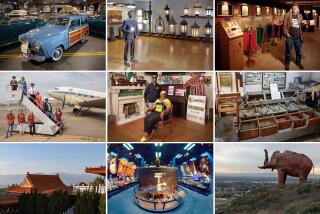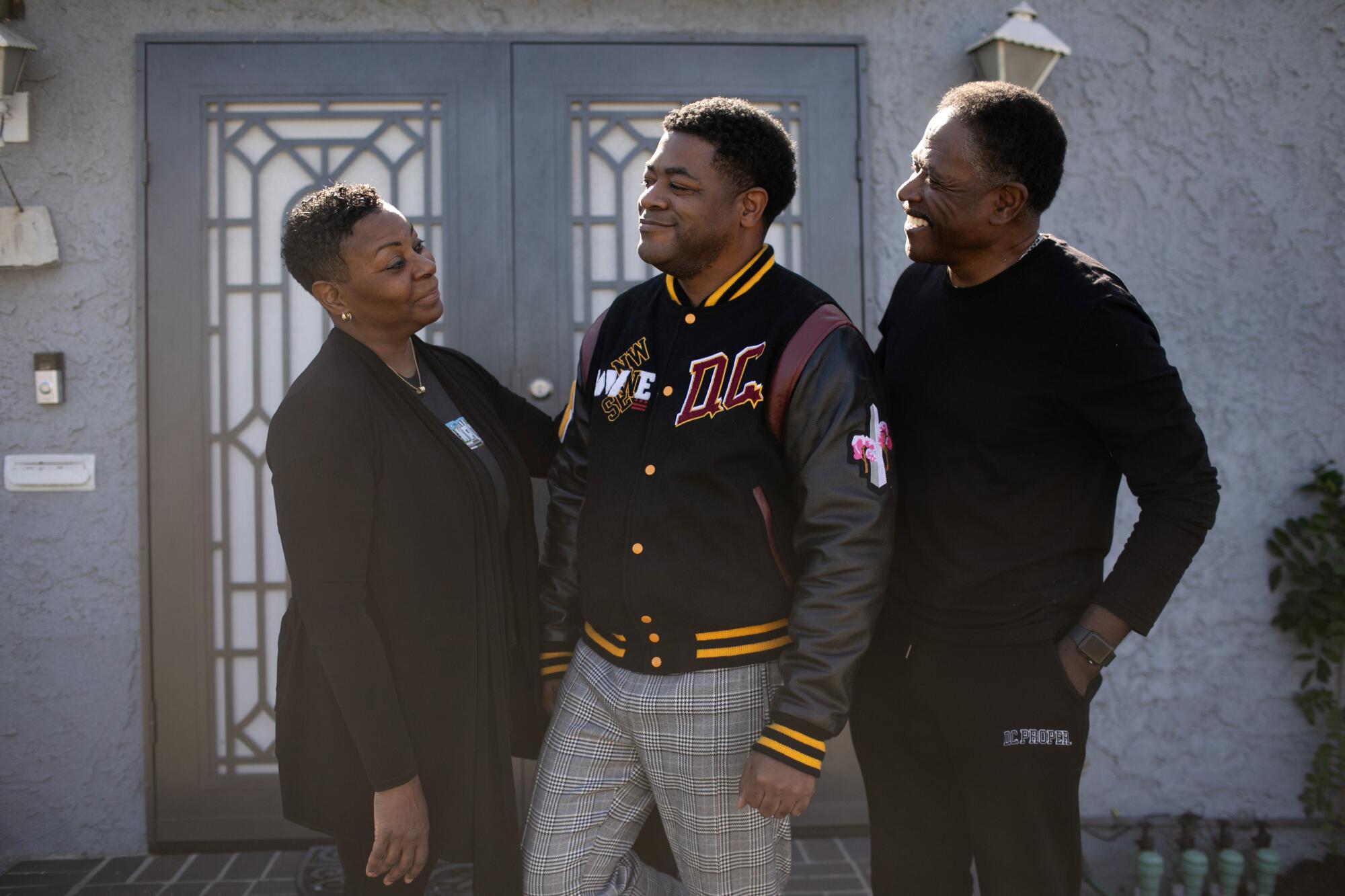
- Share via
Growing up in Compton, David Colbert Jr. always knew he was surrounded by greatness — even if the outside world couldn’t see it yet.
He could point to the tennis courts where Venus and Serena Williams honed their skills. He’d watched Kendrick Lamar’s rise to rap superstardom. He went to Dominguez High School with future Oscar-winning director Travon Free, who won a statuette for his film “Two Distant Strangers.” He watched former NBA stars Tayshaun Prince and Tyson Chandler play in high school basketball games.
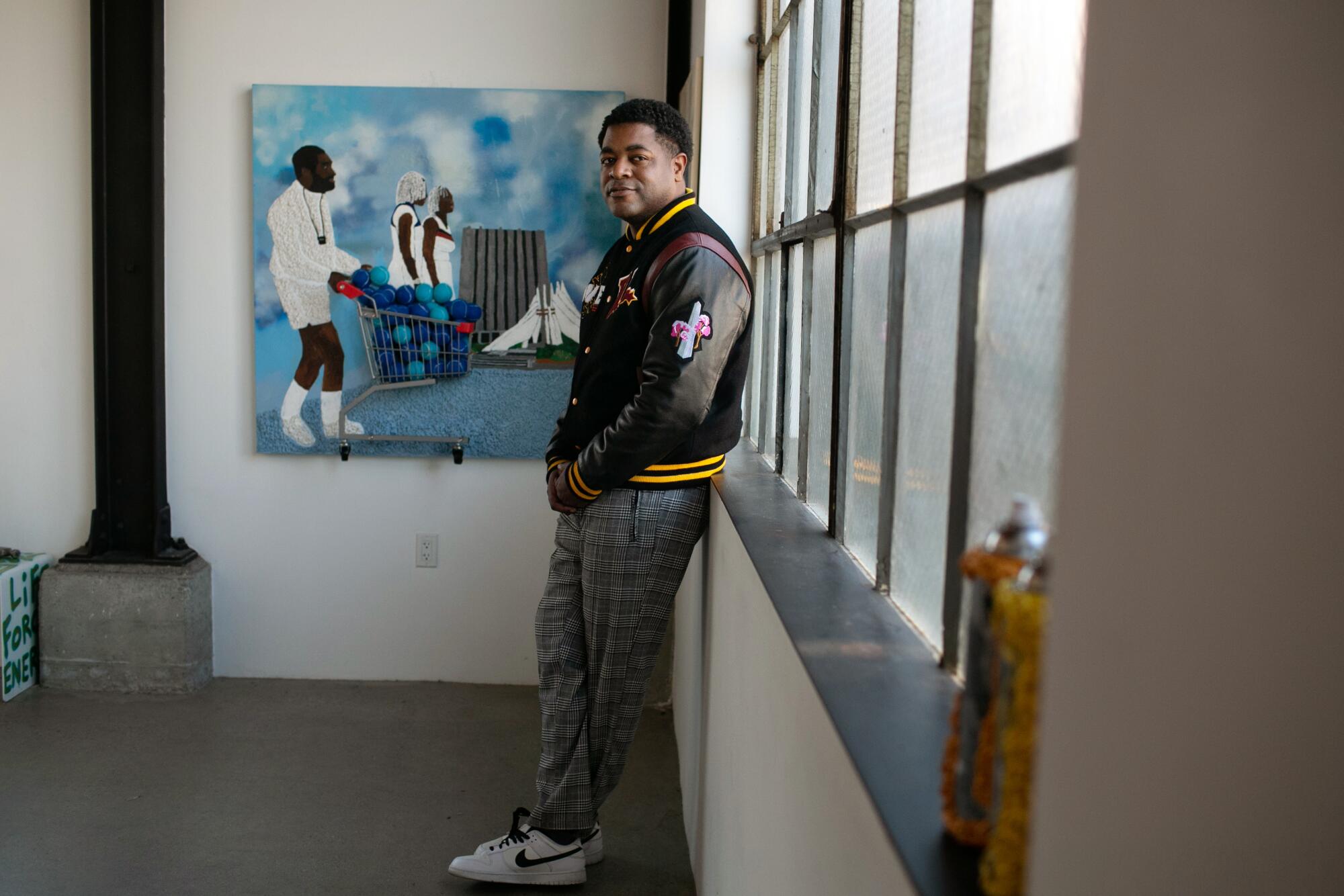
“What sets Compton apart is that we have a long lineage of success stories,” said Colbert, a gallery owner and longtime art curator. “So I always took pride in that and wanted to leave my mark.”
That’s why when SoLa Impact — an affordable housing and real estate investment company — offered Colbert an opportunity to open the first business inside its South L.A. complex known as the Beehive in 2021, Colbert made sure to represent his hometown right from the jump.
“I could have named the gallery anything,” he said about Gallery 90220, which is inspired by his Compton ZIP code. “But it was important for me to say like, ‘Hey, I’m 90220. I’m from Compton’ in any space.” He plans to open a large-scale gallery or museum in Compton in the near future.
Colbert’s dedication to his hometown, whether it’s through Gallery 90220 or the Compton Art Walk — which he launched in 2018 — stems from his roots in the city, which go back three generations.
At 85, his only living grandparent, Maryland Morris, is among the oldest living residents in Compton. Colbert’s parents, Yolondra and David Colbert Sr., who’ve been married for more than 40 years, met at Compton High School and regularly volunteer at their alma mater and with other local nonprofit organizations. And Colbert’s younger sister, Christian, has a clothing brand called Compton Flight Crew, which pays homage to their hometown.
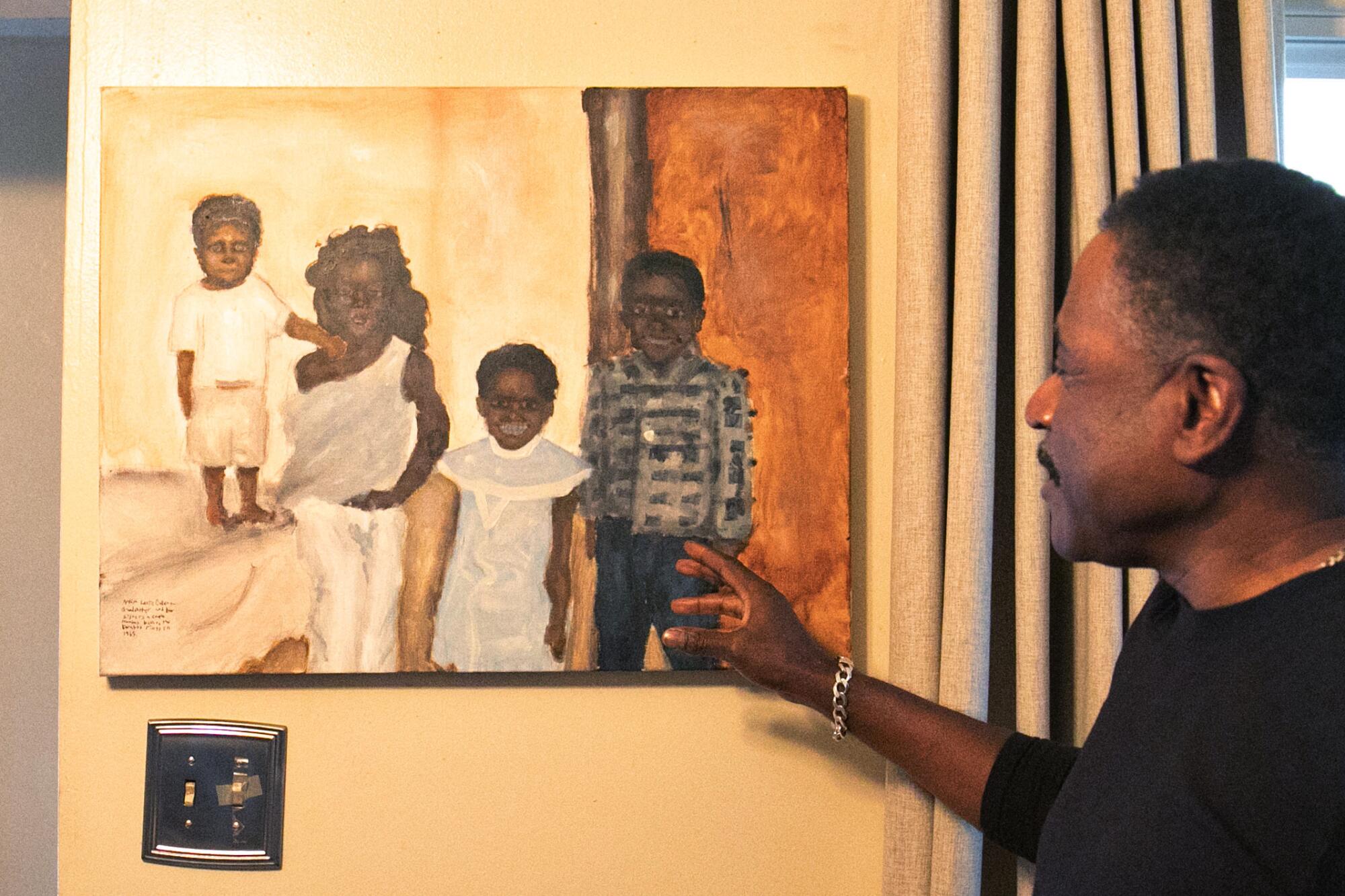
“Our passion for the city is multigenerational,” Colbert said.
Born in Chicago, Morris — Colbert’s maternal grandmother — moved to L.A. with her mother and sister when she was a preschooler. Her mother had just gotten a divorce and wanted to be closer to her brother, who already lived in the city, which had been offering more job opportunities to Black people.
Morris had fond memories of her South L.A. neighborhood, which was diverse, but by 1962, she found herself in Compton, where she was able to fulfill one of her lifetime goals: purchasing her own home. With three children, including Colbert’s mother, Yolondra, Morris stayed home while her then-husband worked. She later went on to become an occupational therapist and earn her bachelor’s degree online at age 72.
“I’m a go-getter,” Morris said, adding that the women in her family have passed down their drive to her. “I’ve carried that on with my children,” and now they’ve taught that to their children.
“It’s just amazing to me and I’m just so proud of it. It actually brings tears to my eyes,” Morris added. “We’re just a proud family. Always have been.”
She’s stayed in Compton, living in the same house that she purchased more than 50 years ago. Her community, which has gone from primarily Black in the 1970s to mostly Latino, has changed significantly, but her reason for staying in the city is simple: “I just love Compton,” she said. “It’s a beautiful city and I’ve been here for so long.”
The journey to Compton for Colbert’s paternal side of the family was much different. His grandfather — a blues musician who went by the name Stormy Herman — left his home in Louisiana after both of his parents died. As a teenager in the 1930s, he bounced around the country, becoming engulfed in the emerging Delta Blues scene, before making his way to L.A. In the late 1950s, he married Colbert’s grandmother, Vernice, who was also from Louisiana.
The couple had four children, including Colbert’s father, David, and moved into a small duplex in Watts, which was among the few neighborhoods where Black people were allowed to live due to restrictive covenants, he said. But their lives changed after the Watts Riots happened in 1965.
“We literally lived a couple of blocks from the downtown area, so I remember the flames,” said 61-year-old David, who was 4 years old at the time. “I can remember standing on the curb, looking at white national guards holding guns, literally riding down my street.”
When word began to spread that Black people could buy homes in Compton — which was considered a suburb at the time, according to David — his family jumped at the opportunity.
He later met his wife, Yolondra, through a mutual friend during his senior year at Compton High School. The couple got married shortly after graduation and decided to plant their own roots in the city, buying a house — where they still live today — in 1985.
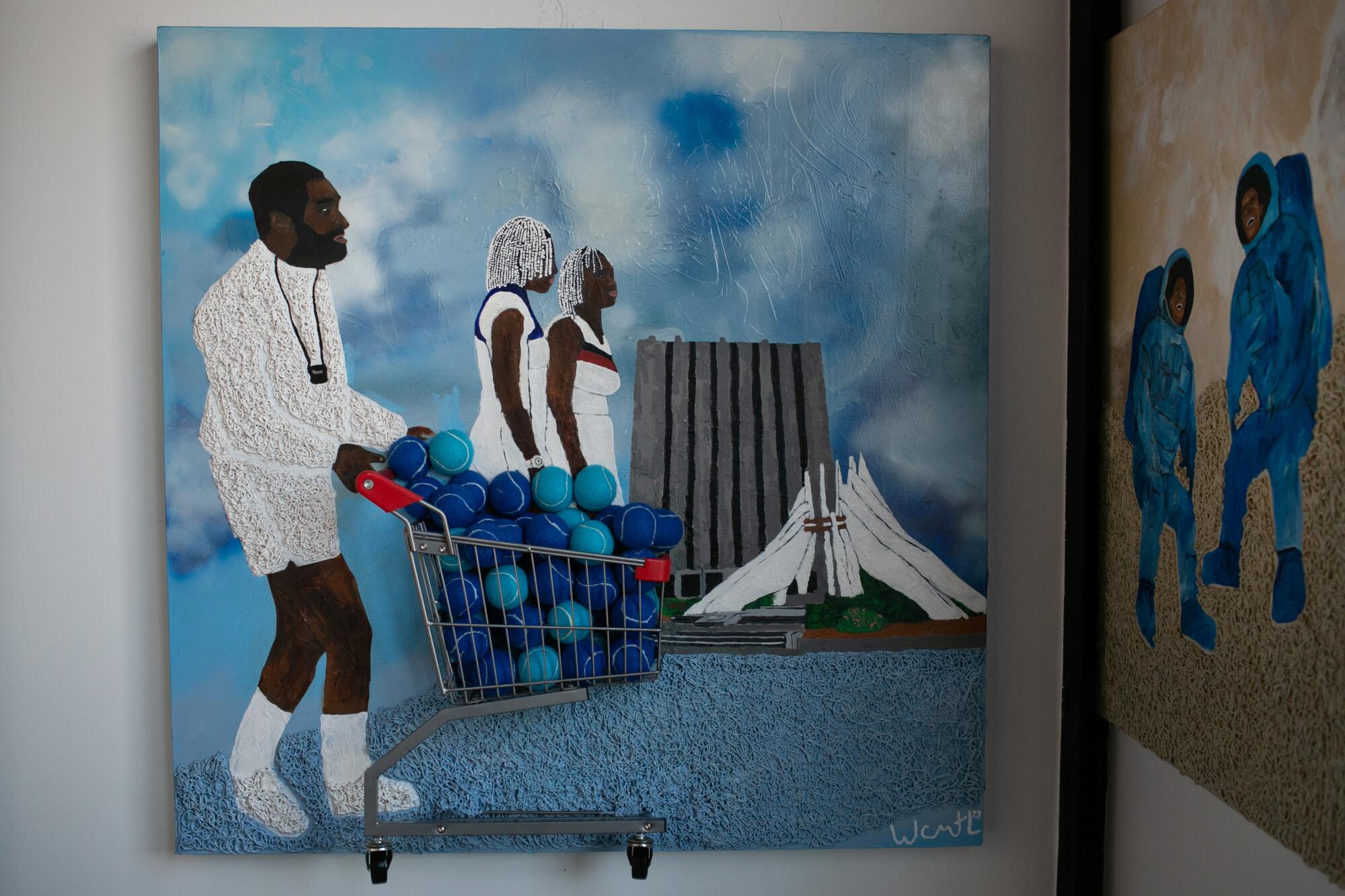
“We practice what we preach,” said David, who was a meat manager for 35 years. “Instead of talking about being from Compton” and then moving to the suburbs, “I preach to my kids, ‘You’re from Compton, then you need to be in Compton.’ You have to bring positive change.”
The couple, who are longtime real estate investors, can often be seen selling soul food through their vendor business, Colbert’s Southern Gourmet, at local events, including Colbert’s Compton Art Walk.
In many ways, each generation of the Colberts has become synonymous with community service and Compton, which is something that they’ve prided themselves on. And that positive reputation, along with his own motivation and artistic taste, is what’s helped Colbert become a well-known connector not only in the art world, but also in entertainment.
Stepping inside of Gallery 90220 — Colbert’s first gallery — his passion for amplifying Black history and culture is palpable. There’s a dedication wall filled with covers of Jet magazine — the historic Black-owned publication — that he created with USC lecturer and Gensler designer Kevin Sherrod. A recent exhibit by New Orleans-born photographer Delaney George depicts all Black women.
Another exhibition by L.A.-based artist Will Raojenina features paintings of various notable Black athletes including Jackie Robinson, Michael Jordan and the Williams sisters. Both artists were able to showcase their work at Frieze Los Angeles — the massive art fair — thanks to Colbert.
As a Montreal native, Raojenina struggled to break into the art scene when he moved to L.A. nearly two years ago. For some galleries, “if you’re not poppin’ or you’re not someone who’s considered well known, then they don’t really mess with you. But [Colbert] gave me a chance,” said Raojenina, who held his first solo exhibition at Gallery 90220.
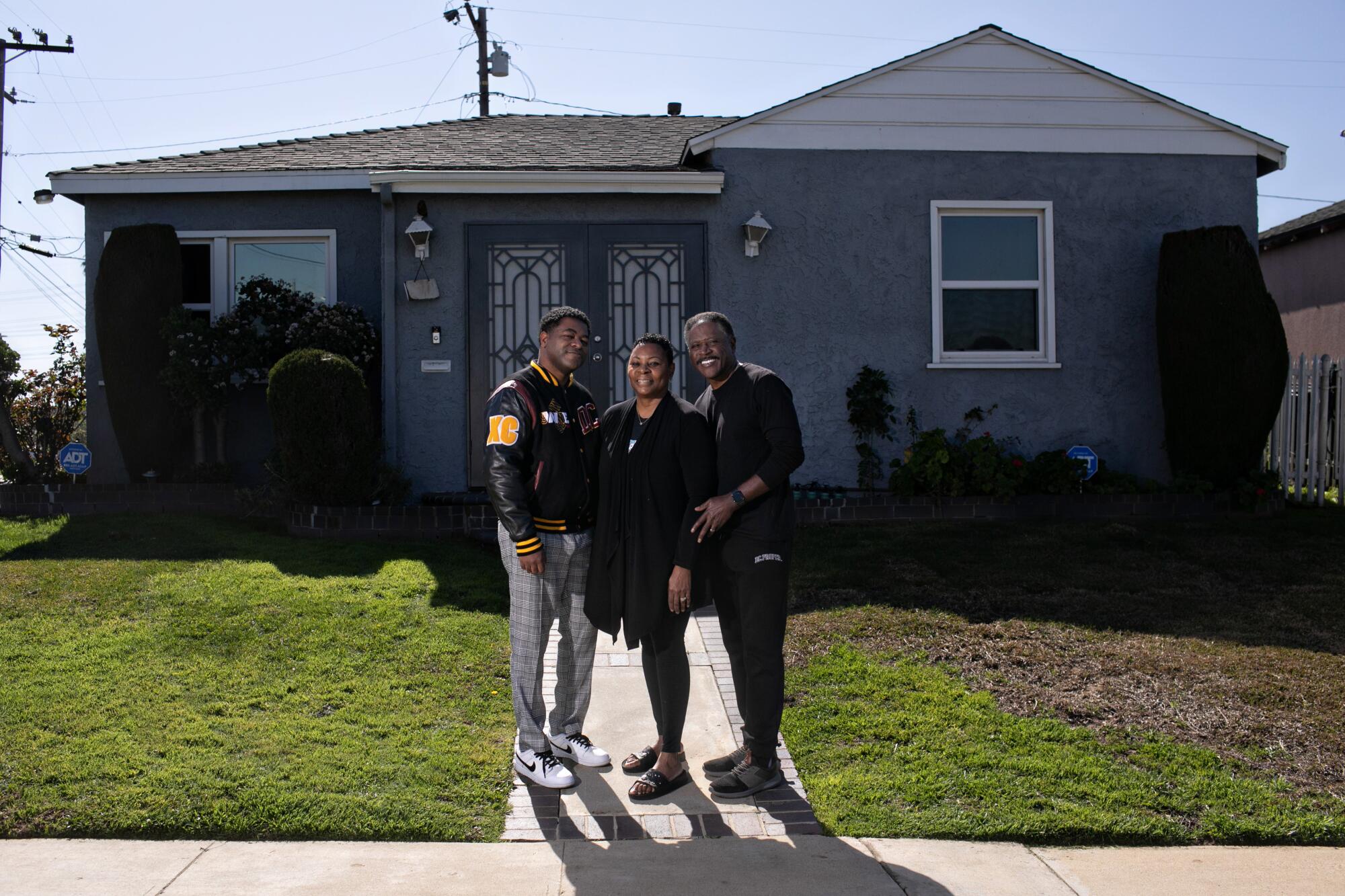
Raojenina added that Colbert is “literally opening doors, but he’s also connecting us with other people in art and other creatives,” which is invaluable.
Colbert regularly sprinkles in the names of other creatives in various fields during conversation. It’s natural for him and is the main reason that he opens his gallery up to others, especially those from his hometown. Since opening, Gallery 90220 has hosted everything from book signings to networking events and panels, and Colbert has even let musicians shoot music videos there.
Reflecting on his personal journey and that of his family’s, Colbert’s mindset makes sense.
“I know what it’s like not to have access to things,” Colbert said. “So if I can help other creatives have it easier,” then that’s what I’m going to do. “I’m always sensitive to somebody’s comeup and their start, and I think people who are talented deserve space. So I always like to share space and elevate others.”
More to Read
The biggest entertainment stories
Get our big stories about Hollywood, film, television, music, arts, culture and more right in your inbox as soon as they publish.
You may occasionally receive promotional content from the Los Angeles Times.


